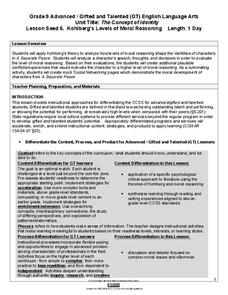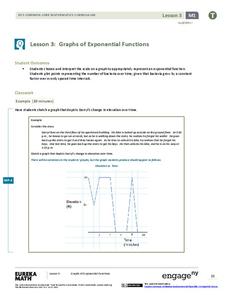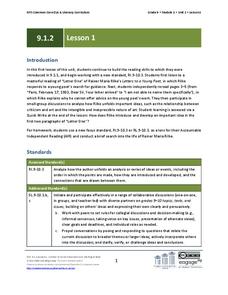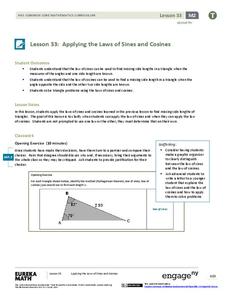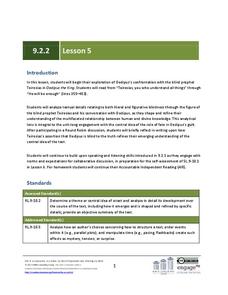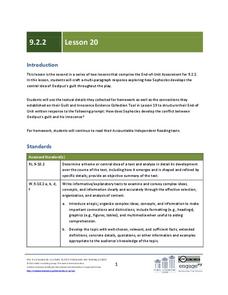EngageNY
Interpreting Residuals from a Line
What does an animal's gestation period have to do with its longevity? Use residuals to determine the prediction errors based upon a least-square regression line. This second lesson on residuals shows how to use residuals to create a...
Olomana School
Mixtures and Solutions: Paper Chromatography Experiment
Why does some ink bleed through paper, and other ink doesn't? Practice some paper chromatography to separate the colors from a pen with an interactive experiment for middle and high schoolers. Learners use a variety of solutions to track...
MENSA Education & Research Foundation
Hurricanes
Learn the ins and outs of hurricanes through a series of lessons answering, "What is a hurricane? How does it travel? How is one formed, measured, and named?" Information is presented through informative text and images, while...
Maryland Department of Education
The Concept of Identity Lesson 6: Kohlberg's Levels of Moral Reasoning
How does our moral reasoning shape our identity? After a study of Kohlberg's Levels of Moral Reasoning, readers use Kohlberg's theories to analyze the speech, thoughts, and decisions of a character in A Separate Peace. They then...
EngageNY
Graphs of Exponential Functions
What does an exponential pattern look like in real life? After viewing a video of the population growth of bacteria, learners use the real-life scenario to collect data and graph the result. Their conclusion should be a new type of...
EngageNY
Notices, Wonders, and Vocabulary of the Third Stanza of “If”
How does one's experience reading a poem's text differ from listening to its audio version? Delve into the insightful question with the poem, If by Rudyard Kipling, as pupils compare and contrast their experience using a note-taking...
EngageNY
Looking Closely at Stanza 3—Identifying Rules to Live By Communicated in “If”
Just as Bud, from the novel Bud, Not Buddy by Christopher Paul Curtis, had rules to live by, so does the poem, If by Rudyard Kipling, but how do the two relate? Pupils delve deep into the poem's third stanza, participate in a grand...
EngageNY
Pitching Your Claim with Best Evidence
Does Bud use his rules to survive or thrive? That is the driving question of a lesson plan following the reading of Bud, Not Buddy by Christopher Paul Curtis. In an argument essay prewriting activity, pupils use textual evidence to...
Brownsville Independent School District
Moral Courage
What does a morally courageous person look like? Discuss principles, peer pressure, and solving problems without violence in a worksheet about moral courage, and the ways you can be a hero to the people around you.
It's About Time
Plate Boundaries and Plate Interactions
How does the Earth continually repair itself? Explore the answer to this question, and others, with a unit on plate boundaries and interaction. Pupils classify the types of movement at plate boundaries and identify the...
EngageNY
Grade 9 ELA Module 1, Unit 2, Lesson 5
How does word choice influence the meaning and tone of a text? To answer this question, class members listen to a masterful reading of a passage from David Mitchell's Black Swan Green and then work with a partner to conduct a close...
EngageNY
Grade 9 ELA Module 1, Unit 2, Lesson 1
Where does a writer find inspiration? "Go into yourself," says Rainer Maria Rilke in "Letter One" from Letters to a Young Poet. Readers of Rilke's letter to Franz Xaver Kappus examine the words and figurative language Rilke uses to...
SaveandInvest.org
Introduction to Earning Interest: Grades 9-10
Does your bank pay you for allowing them to hold your money? The lesson covers three different ways your money can make money. Topics include certificates of deposit, statement savings accounts, and money market accounts.
EngageNY
Grade 9 ELA Module 1: Unit 3, Lesson 7
How does Shakespeare use dialogue to develop the idea that the star-crossed lovers are more concerned with their relationship as individuals than they are with their roles as children of warring families? That is the question facing...
EngageNY
Grade 9 ELA Module 1: Unit 3, Lesson 8
As a mid-unit assessment, class members craft an in-class essay response to the prompt: "How does Shakespeare’s development of the characters of Romeo and Juliet refine a central idea in the play?"
EngageNY
Grade 9 ELA Module 1: Unit 3, Lesson 14
After watching the scene from Romeo + Juliet in which Juliet argues with her parents because she does not want to marry Paris, groups do a close reading of Act 4, scene 1, lines 44-88, examining the word choices in the conversation...
EngageNY
Grade 9 ELA Module 1: Unit 3, Lesson 15
Where does Friar Laurence's loyalty lie? After listening to a reading of Act 4, scene 1, lines 89-126 of Romeo and Juliet, groups examine the details of Friar Laurence's plan.
Mr. E. Science
Volcanoes
What is the difference between a shield volcano and a cinder cone volcano? How does the flow of lava influence the type of rock that's formed? A presentation on different aspects of volcanoes answers these questions for middle...
EngageNY
How Far Away Is the Moon?
Does the space shuttle have an odometer? Maybe, but all that is needed to determine the distance to the moon is a little geometry! The lesson asks scholars to sketch the relationship of the Earth and moon using shadows of an eclipse....
EngageNY
Applying Tangents
What does geometry have to do with depression? It's an angle of course! Learners apply the tangent ratio to problem solving questions by finding missing lengths. Problems include angles of elevation and angles of depression. Pupils make...
EngageNY
Applying the Laws of Sines and Cosines
Breaking the law in math doesn't get you jail time, but it does get you a wrong answer! After developing the Law of Sines and Cosines in lesson 33 of 36, the resource asks learners to apply the laws to different situations. Pupils must...
Read Works
The What and Who of Elections
As citizens living in the United States, it is our civil duty to vote. But how does the voting process work? After reading a five-paragraph passage on the basics of elections and voting, young constituents respond to 10 questions...
EngageNY
Grade 9 ELA Module 2, Unit 2, Lesson 5
Oedipus may be the king, but he certainly does not rule—or see—all. Analyze his interaction with Teiresias in an instructional activity focused on the central idea of Sophocles' Oedipus the King. As pairs of ninth graders discuss...
EngageNY
Grade 9 ELA Module 2, Unit 2, Lesson 20
Oedipus' lack of literal and figurative vision does not mean he cannot see his guilt in the terrible fates of Laius, Jocasta, and all the lives touched by prophecy. Conclude a literary analysis unit on Sophocles' Oedipus the King with a...
Other popular searches
- Picture Does Not Belong
- Life Doesn't Frighten Me
- Al Capone Does My Shirts
- Do and Does
- Sentence Doesn't Belong
- Which Word Does Not Belong
- Beatrice Doesn't Want To
- Does Not Belong
- How Does Light Travel
- Sentence Does Not Belong
- Which Does Not Belong
- Anansi Does the Impossible



